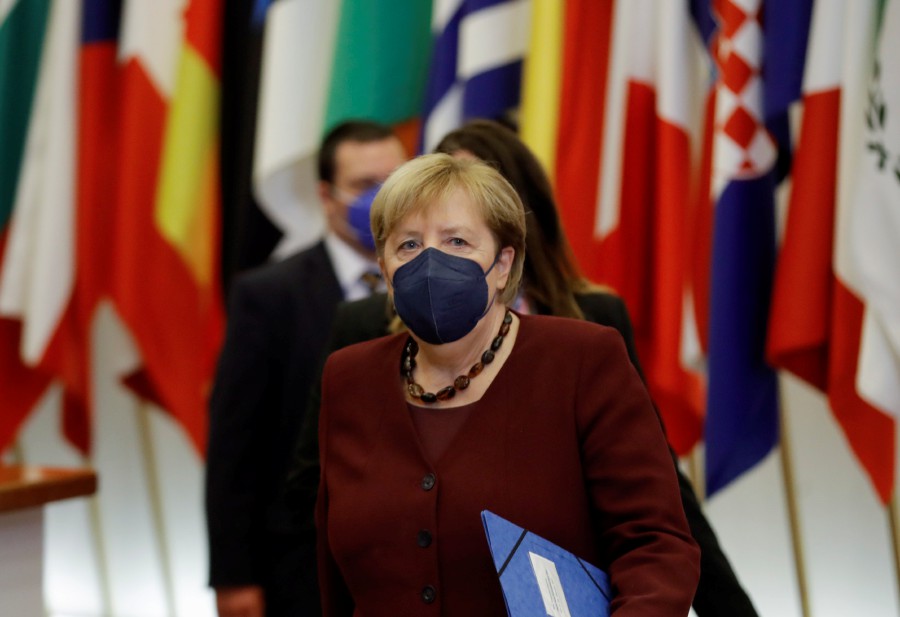
BRUSSELS, Oct 23 (NNN-AGENCIES) — European leaders heaped praise on outgoing German Chancellor Angela Merkel as she participated in her last European Union summit after a 16-year reign heavily influencing the bloc through major ups and downs.
Merkel has attended a staggering 107 EU summits that saw some of the biggest twists in recent European history, including the eurozone debt crisis, an inflow of Syrian refugees, Brexit and the creation of the bloc’s landmark pandemic recovery fund.
“You are a monument,” the host of the summits, European Council chief Charles Michel, said in Friday closed-door homage to her, according to an official in the room.
An EU summit “without Angela is like Rome without the Vatican or Paris without the Eiffel tower”, Michel said after Merkel’s 26 counterparts gave her a standing ovation.
He handed Merkel what was described as an “artistic impression” of the Europa building, a contemporary glass-topped cube where summits are hosted.
Luxembourg Prime Minister Xavier Bettel called Merkel a “compromise machine” who “usually did find something to unite us” through marathon intra-EU negotiations.
“Europe will miss her,” he said.
“She is someone who for 16 years has really left her mark on Europe, helping all 27 of us to take the right decisions with a lot of humanity at times that were difficult,” said Belgian Prime Minister Alexander De Croo.
Lithuanian President Gitanas Nauseda said he hoped Merkel, a “great politician”, would remain on the political scene “in one form or another”.
Austrian Chancellor Alexander Schallenberg called her “undoubtedly a great European” and “a haven of peace, if you like, within the European Union”.
Her departure, he said, “will leave a hole”.
Her final summit, a two-day affair in Brussels, leaned once again on her soft-power skills to ease a burning row with Poland over its rejection of the EU’s legal order – something many believed could be the next existential threat to the European Union.
On first day on Thursday, Polish Prime Minister Mateusz Morawiecki defended an Oct 7 ruling by his country’s Constitutional Court that said EU law applied only in specific, limited areas and Polish law prevailed in all others.
Merkel, backed by French President Emmanuel Macron, spent her considerable political capital pushing for dialogue with Poland, warning against a “cascade” of legal fights if the issue blew up into challenges before the European Court of Justice.
The message was received by the EC and countries such as the Netherlands and Belgium that wanted a more muscular slapdown of Poland, which they accuse of rolling back democratic norms by removing judicial independence in national courts.
East-west feuding has been a recurrent theme in Merkel’s long tenure.
Her mediating role reflected both the status of Germany as the EU’s economic powerhouse with sway over many of the former Soviet-bloc countries, whose membership to the union tilted the political balance away from Paris and towards Berlin.
It also spoke to Merkel’s family background, of German and Polish descent, as well as her tactic of discreet behind-the-scenes nudging while conflicting forces exhausted themselves, before stepping in with a compromise solution.
Migration has been one of the most divisive issues with eastern countries.
Hungarian Prime Minister Viktor Orban was among those who railed against Merkel’s unusually bold decision in 2015 to open Germany’s borders to more than a million asylum seekers, mostly from war-torn Syria.
Orban – backed by Slovakia, the Czech Republic and Poland – simply ignored an EU directive to share the burden, causing a rift on migration that has yet to heal.
The migration issue was on the table again on the second day of the summit on Friday.
But with the migration-leery positions of the eastern countries already well known, and to an extent backed by Austria and the Netherlands, little substantive discussion was expected, and certainly no breakthrough on burden-sharing.
Germany is still in the process of putting together a government to replace Merkel’s, following September elections she did not contest that saw her conservative CDU party handed a drubbing. — NNN-AGENCIES
